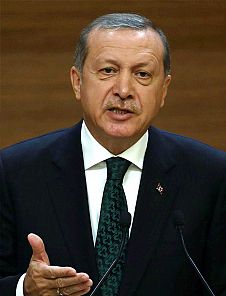HE Recep Tayyip Erdoğan was the Prime Minister of Türkiye for 11 years, winning three consecutive elections with a majority (2002, 2007 and 2011), before becoming Türkiye’s first popularly elected president in August 2014. He secured a second term in the 2018 election and then won a hard-fought 2023 election. During his terms, Türkiye has seen unprecedented economic growth, constitutional reform, and its re-emergence as a major global power. All this, combined with his unapologetic voice on the world stage and support of Muslim issues, have won over Muslims worldwide.
Birth: 26 February 1954 (Age: 71)
Source of Influence: Political
Influence: President of 86 million Turkish citizens
School of Thought: Sunni, Traditional Sunni
Status: Featured in current year
HE Recep Tayyip Erdoğan was the Prime Minister of Türkiye for 11 years, winning three consecutive elections with a majority (2002, 2007 and 2011), before becoming Türkiye’s first popularly elected president in August 2014. He secured a second term in the 2018 election and then won a hard-fought 2023 election. During his terms, Türkiye has seen unprecedented economic growth, constitutional reform, and its re-emergence as a major global power. All this, combined with his unapologetic voice on the world stage and support of Muslim issues, have won over Muslims worldwide.
Elections: Erdoğan secured 52.1% of the vote in the second-round run-off in the 2023 presidential election. This was a continuation of his remarkable popularity and success at the ballot box over the past two decades. During his time as President he has pushed for more powers for his post, criticised by many as signs of wanting excessive power, and lost support from key members of his own party. The March 2024 local elections saw the opposition increase its hold on Istanbul and Ankara and saw the AKP relegated to second-party status for the first time since its 2001 founding.
Challenges: “Erdonomics”, as the President’s unorthodox, economic policies are referred to, have driven down the lira 80% over the last few years, resulting in inflation problems. The appointment of Mehmet Şimşek and his more orthodox economic policies have started to regain the confidence of foreign investors as well as locals.
Failed Coup Ramifications: The ramifications of the failed coup of 15 July 2016, which led to about 200 deaths, still continue. Erdoğan squarely laid the blame of orchestrating the coup on Fethullah Gülen, and has led an all-out attack on Gülen’s organizations and supporters. There has been a major crackdown on many sectors with about 160,000 civil servants being dismissed in various state institutions, with over half from the education sector. Also, 50,000 people remain in detention with this number continually rising as authorities press ahead with regular raids.
Between the US and Russia: Ties with the US have strained considerably since Türkiye decided to purchase the Russian S-400 defence system instead of the Patriot surface-to-air missile system. The US responded by suspending Türkiye from the F-35 jet programme and holding up other arms deals. Türkiye is playing a balancing role with Russia following the latter’s war with Ukraine, and is key for Europe’s energy flow.
Hagia Sophia: Hagia Sophia, built in 537 CE as the patriarchal cathedral of Constantinople, was converted into the Fatih Mosque after Sultan Mehmed II conquered the city in 1453. In 1935, and in line with his effort to erase Türkiye’s Islamic identity, Atatürk converted Hagia Sophia into a museum. In July 2020, Erdoğan reversed Atatürk’s decision and reclassified Hagia Sophia as a mosque—a decision celebrated by most Muslims.
Soft Power: The soft power of the Turkish film industry has played a large part in growing Türkiye’s influence throughout the Muslim world. Historical dramas about Sulayman the Magnificent and Sultan Abdul-Hamid II were hugely popular in the Arab world, but the drama about Ertuğrul, (Diriliş: Ertuğrul), the legendary father of the founder of the Ottoman Empire, has intensified and broadened this influence. Leaders of other Muslim countries have not only urged their citizens to watch it, but have also taken it as a model with which to develop their own indigenous dramas.
Name Change: In 2022 an official request for Turkey to be changed to Türkiye (tur-key-YAY) as it is spelled and pronounced in Turkish was accepted by the UN. The country has called itself Türkiye since its declaration of independence in 1923.
Gaza: Erdoğan’s rhetoric on the Gaza war has been tough at times, and Türkiye severed trade with Israel in May 2024. Erdoğan also met with the late Hamas leader Ismail Haniyeh and supported South Africa’s genocide case against Israel at the ICJ. Despite these measures, Erdoğan faces continued criticism for not doing enough, particularly regarding the supply of Azerbaijani oil to Israel via Türkiy and the Kürecik radar base which was established in 2012 for use by NATO.
“If we look at history, we will see that regimes which persecute [their people] do not remain standing.”
2,023 metre the world’s longest suspension
bridge
52% of the vote won by Erdoğan
News about Recep Tayyip Erdogan
- No approved news items yet.



